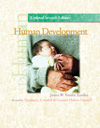 |  Human Development: Updated, 7/e James Vander Zanden,
Ohio State University
Thomas Crandell,
Broome Community College
Corinne Crandell,
Broome Community College
Middle Adulthood: Emotional and Social Development
Chapter OutlineChapter 16 focuses on some of the changing aspects of mid-life associated with the family life cycle and the workplace. Two main topics are addressed:
1Social Relationships. The importance of developing friendships and becoming part of a couple during adulthood are examined. Issues such as the battering of women, extramarital sexual relationships, divorce, and remarriage are all covered in detail. The difficulties as well as the opportunities encountered by stepfamilies as a result of remarriage are considered. The empty-nest period - when children have grown up and left home - is discussed, along with the topic of adults caring for their elderly parents. |
 |  |  | 2The Workplace. Individual satisfaction derived from work and the factors associated with job burnout are discussed. Mid-life career changes are also examined. The impact of unemployment and the four stages commonly resulting from job loss are outlined. Also addressed are female work force expansion and its effects on women and traditional gender roles. Finally, the significance of dual-career couples is presented. |
 |  |  | 3Theories of Self. Life-span perspectives, stage models, trait models, situational models, and interactionist models are discussed. |
|



 2003 McGraw-Hill Higher Education
2003 McGraw-Hill Higher Education